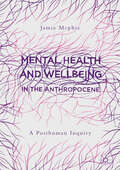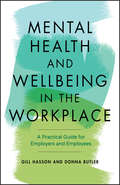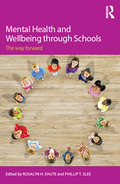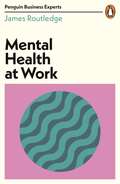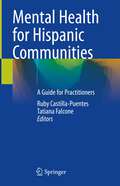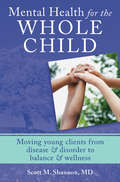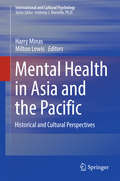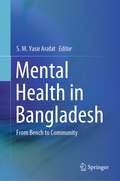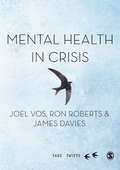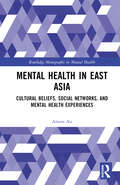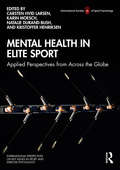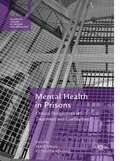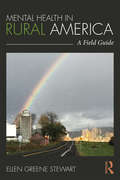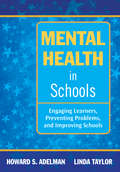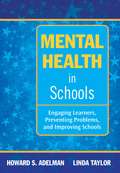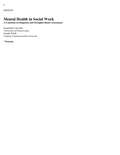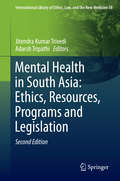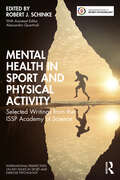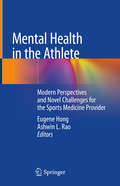- Table View
- List View
Mental Health and Wellbeing in the Anthropocene: A Posthuman Inquiry
by Jamie McphieThis book makes the unorthodox claim that there is no such thing as mental health. It also deglamourises nature-based psychotherapies, deconstructs therapeutic landscapes and redefines mental health and wellbeing as an ecological process distributed in the environment – rather than a psychological manifestation trapped within the mind of a human subject. Traditional and contemporary philosophies are merged with new science of the mind as each chapter progressively examples a posthuman account of mental health as physically dispersed amongst things – emoji, photos, tattoos, graffiti, cities, mountains – in this precarious time labelled the Anthropocene. Utilising experimental walks, play scripts and creative research techniques, this book disrupts traditional notions of the subjective self, resulting in an Extended Body Hypothesis – a pathway for alternative narratives of human-environment relations to flourish more ethically. This transdisciplinary inquiry will appeal to anyone interested in non-classificatory accounts of mental health, particularly concerning areas of social and environmental equity – post-nature.
Mental Health and Wellbeing in the Workplace: A Practical Guide for Employers and Employees
by Gill Hasson Donna ButlerProvides guidance for both employers and staff on promoting positive mental health and supporting those experiencing mental ill health in the workplace The importance of good mental health and wellbeing in the workplace is a subject of increased public awareness and governmental attention. The Department of Health advises that one in four people will experience a mental health issue at some point in their lives. Although a number of recent developments and initiatives have raised the profile of this crucial issue, employers are experiencing challenges in promoting the mental health and wellbeing of their employees. Mental Health & Wellbeing in the Workplace contains expert guidance for improving mental health and supporting those experiencing mental ill health. This comprehensive book addresses the range of issues surrounding mental health and wellbeing in work environments – providing all involved with informative and practical assistance. Authors Gill Hasson and Donna Butler examine changing workplace environment for improved wellbeing, shifting employer and employee attitudes on mental health, possible solutions to current and future challenges and more. Detailed, real-world case studies illustrate a variety of associated concerns from both employer and employee perspectives. This important guide: Explains why understanding mental health important and its impact on businesses and employees Discusses why and how to promote mental health in the workplace and the importance of having an effective ‘wellbeing strategy’ Provides guidance on managing staff experiencing mental ill health Addresses dealing with employee stress and anxiety Features resources for further support if experiencing mental health issues Mental Health & Wellbeing in the Workplace is a valuable resource for those in the workplace wanting to look after their physical and mental wellbeing, and those looking for guidance in managing staff with mental health issues.
Mental Health and Wellbeing through Schools: The Way Forward
by Phillip T. Slee Rosalyn H. ShuteMental Health and Wellbeing through Schools brings together international experts from various disciplines to identify and address a range of current challenges in this rapidly-developing field of endeavour. <P><P> The opening chapter details lessons learned from research and practice, outlining some emerging challenges for the effective implementation of mental health initiatives in schools. Subsequent chapters take up the various issues, exploring problems and proposing solutions. Topics fall within four broad areas: <P><P> <P><P>Organisational and leadership issues such as dealing with 'wicked' or ‘hard-to-tame’ (complex and resistant) problems and taking a broad public health approach; <P><P>Teacher-related issues, such as how to integrate programs successfully into schools, and teacher skills and professional learning; <P><P>The challenges and opportunities of new technologies, including cyberbullying and the use of online, multimedia and mobile resources for both student and teacher learning and support; <P><P>The need for a greater focus on targeted interventions for at-risk students, such as those with disabilities; also addressing ‘hard-to-tame’ problems such as bullying, youth suicide and depression. <P><P> Mental Health and Wellbeing through Schools will be of interest to those involved in researching, developing, evaluating and implementing mental health initiatives in schools, including academics, practitioners, educators and educational and Mental Health policy makers. It will also be of use to professionals, such as nurses and social workers, concerned with the wellbeing of children and adolescents. The book will have international appeal, with contributors from around the world, experienced in a range of contexts. <P><P> Rosalyn H. Shute is Adjunct Professor of Psychology at both Flinders and Federation Universities (Australia). Her research expertise lies broadly in clinical child psychology and paediatric psychology/child health and wellbeing. She is an experienced teacher of Developmental Psychology, educational and clinical child/paediatric psychology. <P><P> Phillip T. Slee is a Professor in Human Development in the School of Education at Flinders University, Adelaide, Australia. He is a trained teacher and registered psychologist. His main areas of interest include childhood bullying/aggression, mental health and wellbeing, stress and teacher education. He has a particular interest in the practical and policy implications of his research. He and Shute recently co-authored Child Development: Theories and Critical Perspectives.
Mental Health at Work (Penguin Business Experts Series)
by James RoutledgeIt has never been more essential to support our mental health at work. With one in four people experiencing poor mental health right now, we need to start talking about it. Penguin Business Expert James Routledge has worked with CEOs, HR directors, managers and people at all levels on successful mental-health strategies. In this book, he shares his stories, learnings and guidance. Learn how to:- Talk comfortably about mental health- Create a more open and inclusive community in your workplace- Implement unique changes that are authentic to you and your businessFilled with honest and relatable stories, 'conversation starters' and exclusive case studies from a diverse range of businesses and their people, Mental Health at Work will support anyone with their mental health in the workplace journey.
Mental Health at the Crossroads: The Promise of the Psychosocial Approach
by Janet E. WilliamsThis book is a challenge to the enduring status and domination of bio-medical approaches in mental health services. Contributors from four continents argue that this domination, along with modernization and multidisciplinary work, will not improve people's lives unless social and psychological perspectives are appreciated and integrated. This implies new forms of relationships and social arrangements. Mental Health at the Crossroads: the Promise of the Psychosocial Approach is a timely analysis of the psychosocial approach as it resonates across the discipline divide, considering the past and future development. It is written from the perspectives of service users and carers, managers, practitioners, educators, researchers and policy makers, illustrated with case studies from Australia, Brazil, Italy, UK and the USA. This book presents an alternative approach to conventional thinking in mental health, providing a fascinating and valuable resource for those seeking new perspectives, grounded in theory with practice examples, in order to influence the current agenda and change practice.
Mental Health for Hispanic Communities: A Guide for Practitioners
by Tatiana Falcone Ruby Castilla-PuentesThis book is the first authoritative medical text that considers the unique cultural backgrounds of Hispanic populations in a straightforward yet sensitive way, all while building a framework for practical psychiatric assessment and treatment plans. As the only book to consider the unique challenges facing Hispanic mental healthcare, this book is at the forefront of a serious issue that has gone unchallenged for too long. The text is written by two expert psychiatrists with an established history of leadership in this space. Chapters carefully and meticulously establish the issues of access to care in Latinx communities before addressing the unique needs of these patients in the context of common psychiatric disorders. Each disorder includes clinical cases for a reader-friendly approach to the challenges that develop effective assessment and treatment plans. Mental Health for Hispanic Communities is a concise yet comprehensive reference invaluable to all clinicians, students, and other medical professionals seeking to work with this population effectively.
Mental Health for the Whole Child: Moving Young Clients from Disease & Disorder to Balance & Wellness
by Scott M. ShannonA leading pediatric psychiatrist shows clinicians a holistic, full-spectrum approach to children's well-being. Every child possesses enormous untapped potential, and yet the number of kids suffering from mental illness today seems to creep ever upward. Depression, anxiety, ADHD, OCD, oppositional defiant disorder, anger issues--you name it--are increasingly prevalent, leaving clinician's offices packed with worried parents and caregivers, wondering how they can help their children. In this book, child psychiatrist Scott Shannon offers a refreshing new path for practitioners who are eager for a more optimistic view of children's mental health, one that emphasizes a child's inherent resilience and resources over pathology and prescriptions. "What is mental health?" Shannon explores the fundamental question, showing that an innate desire for balance--a wholeness--between brain-body-mind lies at the heart of wellness. Such a balance can't be achieved by medication alone, but requires a broad, full-spectrum understanding of children's lives: their diet, social skills, sleep habits, their ability to self-regulate, to find meaning and purpose in life, and their family relationships. Stress, trauma, and poor nutrition are some of the most common barriers to wholeness in kids' lives, and Shannon carefully examines these and other barriers, and what the latest discoveries in neuroplasticity and epigenetics tell us about their ability to overcome them. Readers will learn how to perform a different sort of assessment--one that identifies patterns of imbalance and obstacles to health in a child's life--as well as how to build a meaningful, effective treatment plan around these deficits, and how clinicians can best position themselves to respond effectively. The second part of the book looks at eight of the most common childhood mental health issues--ADHD, depression, behavioral problems, anxiety and OCD, bipolar disorder, substance abuse, autism spectrum disorders, and trauma and PTSD--and a variety of effective complementary treatment tools for each, including dietary changes, nutritional supplements, specific cognitive or behavioral therapies, parenting interventions, medications, and more. Step-by-step treatment plans are included to guide clinicians on how best to approach each presenting problem. Mental Health for the Whole Child combines modern science, cutting-edge psychology, integrative medicine, and clinical wisdom to offer all professionals who work with kids a new, more hopeful way forward.
Mental Health in Asia and the Pacific
by Harry Minas Milton LewisThis far-reaching volume analyzes the social, cultural, political, and economic factors contributing to mental health issues and shaping treatment options in the Asian and Pacific world. Multiple lenses examine complex experiences and needs in this vast region, identifying not only cultural issues at the individual and collective levels, but also the impacts of colonial history, effects of war and disasters, and the current climate of globalization on mental illness and its care. These concerns are located in the larger context of physical health and its determinants, worldwide goals such as reducing global poverty, and the evolving mental health response to meet rising challenges affecting the diverse populations of the region. Chapters focus on countries in East, Southeast, and South Asia plus Oceania and Australia, describing: #65533; National history of psychiatry and its acceptance. #65533; Present-day mental health practice and services. #65533; Mental/physical health impact of recent social change. #65533; Disparities in accessibility, service delivery, and quality of care. #65533; Collaborations with indigenous and community approaches to healing. #65533; Current mental health resources, the state of policy, and areas for intervention. A welcome addition to the global health literature, Mental Health in Asia and the Pacific brings historical depth and present-day insight to practitioners providing services in this diverse area of the world as well as researchers and policymakers studying the region.
Mental Health in Bangladesh: From Bench to Community
by S. M. Yasir ArafatThis book is about mental health in Bangladesh. Bangladesh is a densely populated country in South Asia with a population of about 170 million. It has seen significant economic growth over the last decades, and it has recently improved from being a low-income country to a lower middle-income country. Currently, Bangladesh is facing a double burden of disease, i.e., both communicable and non-communicable. About 60% of the disease burden is incured by non-communicable diseases. Mental disorders are one of the top five burdens of non-communicable disease in the country. However, psychiatry is a neglected issue in Bangladesh. There are high stigma, services gaps, out-of-pocket expense, low mental health literacy, and extreme scarcity of budget. Academically, it has also been under-addressed and under-researched. Therefore, the editor aims to provide a comprehensive book on mental health in Bangladesh, based on existing evidence and expertise, focusing on academic aspects of community mental health service.
Mental Health in Children and Young People: Spotting Symptoms and Seeking Help Early
by Sarah Vohra`I?m worried that my child is depressed and anxious.? `I?m worried that my child has an eating disorder.? `I?m worried about drugs.? Mental health difficulties affect about 1 in 10 children and young people, ranging from fears, phobias and panic attacks to obsessions, compulsions and even psychosis. Written by a specialist psychiatrist and packed with expert advice, this comprehensive book highlights the often subtle warning signs of trouble and suggests tactful, effective ways to take action, whether your child is 6 or 16. An invaluable resource for parents, extended family, teachers, social workers, and anyone concerned about a young person?s emotional well-being. Topics include:when to worrycommunicating with your child ? practical techniques bipolar disorderattention deficit hyperactivity disorder (ADHD)autismtrauma and griefbullying and abusesleep and well-beinghelp from your doctorred flags and managing emergenciesDr Sarah Vohra says, `Gut instinct is the most undervalued tool we own. Some parental anxiety is natural, but if you think something?s wrong, trust your instinct. Don?t ignore it or try to justify worrying behaviour as normal ups and downs. Early intervention is key ? so talk to your child and seek professional help sooner rather than later.?
Mental Health in China and the Chinese Diaspora: Historical and Cultural Perspectives (International and Cultural Psychology)
by Harry MinasFollowing on the previous volume, Mental Health in Asia and the Pacific, which was co-edited with Milton Lewis, this book explores historical and contemporary developments in mental health in China and Chinese immigrant populations. It presents the development of mental health policies and services from the 19th Century until the present time, offering a clear view of the antecedents of today’s policies and practice. Chapters focus on traditional Chinese conceptions of mental illness, the development of the Chinese mental health system through the massive political, social, cultural and economic transformations in China from the late 19th Century to the present, and the mental health of Chinese immigrants in several countries with large Chinese populations. China’s international political and economic influence and its capabilities in mental health science and innovation have grown rapidly in recent decades. So has China’s engagement in international institutions, and in global economic and health development activities. Chinese immigrant communities are to be found in almost all countries all around the world. Readers of this book will gain an understanding of how historical, cultural, economic, social, and political contexts have influenced the development of mental health law, policies and services in China and how these contexts in migrant receiving countries shape the mental health of Chinese immigrants.
Mental Health in Counselling and Psychotherapy (Counselling and Psychotherapy Practice Series)
by Norman ClaringbullThis book examines how counsellors and psychotherapists interact with those clients who may suffer from mental health issues. While practising counsellors and psychotherapists meet clients who have problems across the entire mental health spectrum, there are a number of particular disorders that these practitioners are particularly likely to encounter. These include anxiety, depression, stress, addiction, phobias and behavioural problems. In this book, all of these conditions are explained and the ways in which therapists can best help such clients are discussed. There are sections on client assessments as well as addiction issues and understanding mental health law.
Mental Health in Crisis (SAGE Swifts)
by Joel Vos Ron Roberts Dr. James DaviesAt a time of huge pressures on mental health services, this highly topical, broad-ranging and thought-provoking analysis of the mental health crisis examines the current challenges in mental health service delivery and access using a range of perspectives (political, economic, and cultural, organisational issues). It then puts forward a number of alternatives, reviewing both current and alternative initiatives, and exploring what is needed for a mentally healthy society.
Mental Health in Crisis (SAGE Swifts)
by James Davies Joel Vos Ron RobertsAt a time of huge pressures on mental health services, this highly topical, broad-ranging and thought-provoking analysis of the mental health crisis examines the current challenges in mental health service delivery and access using a range of perspectives (political, economic, and cultural, organisational issues). It then puts forward a number of alternatives, reviewing both current and alternative initiatives, and exploring what is needed for a mentally healthy society.
Mental Health in East Asia: Cultural Beliefs, Social Networks, and Mental Health Experiences (Routledge Monographs in Mental Health)
by Anson AuThis pioneering monograph examines how culture informs popular understandings and experiences of mental health in East Asia, as well as providing resolutions for the future. Questions about mental health problems have gained new urgency as their consequences are growing more visible in East Asia. Yet, our understanding, funding, and evidence has not kept pace. Anson Au explores the social and psychological concepts, and network structures that make up the blueprint of East Asian cultures and untangles their myriad of influences on how people think, feel, and trust with respect to mental health experiences. Chapters explore themes such as cultural beliefs about mental health, the role of social support and social media, and mental health stigma. Drawing on the latest quantitative evidence, network science, and novel qualitative data, this book paints a portrait of mental health in the region and articulates culturally sensitive policies and practices tailored for East Asian cultures that improve mental health experiences.
Mental Health in Elite Sport: Applied Perspectives from Across the Globe (ISSP Key Issues in Sport and Exercise Psychology)
by Carsten Hvid LarsenMental Health in Elite Sport: Applied Perspectives from Across the Globe provides a focused, exhaustive overview of up-to-date mental health research, models, and approaches in elite sport to provide researchers, practitioners, coaches, and students with contemporary knowledge and strategies to address mental health in elite sport across a variety of contexts. Mental Health in Elite Sport is divided into two main parts. The first part focuses globally on mental health service provision structures and cases specific to different world regions and countries. The second part focuses on specific mental health interventions across countries but also illustrates specific case studies and interventions as influenced by the local context and culture. This tour around the world offers readers an understanding of the massive global differences in mental health service provision within different situations and organizations. This is the first book of its kind in which highly experienced scholars and practitioners openly share their programs, methods, reflections, and failures on working with mental health in different contexts. By using a global, multi-contextual analysis to address mental health in elite sport, this book is an essential text for practitioners such as researchers, coaches, athletes, as well as instructors and students across the sport science and mental health fields.
Mental Health in Prisons: Critical Perspectives on Treatment and Confinement (Palgrave Studies in Prisons and Penology)
by Alice Mills Kathleen KendallThis book examines how the prison environment, architecture and culture can affect mental health as well as determine both the type and delivery of mental health services. It also discusses how non-medical practices, such as peer support and prison education programs, offer the possibility of transformative practice and support. By drawing on international contributions, it furthermore demonstrates how mental health in prisons is affected by wider socio-economic and cultural factors, and how in recent years neo-liberalism has abandoned, criminalised and contained large numbers of the world’s most marginalised and vulnerable populations. Overall, this collection challenges the dominant narrative of individualism by focusing instead on the relationship between structural inequalities, suffering, survival and punishment. Chapter 2 of this book is available open access under a CC BY 4.0 license via link.springer.com.
Mental Health in Rural America: A Field Guide
by Ellen Greene StewartThis book provides a comprehensive overview of mental health in rural America, with the goal of fostering urgently needed research and honest conversations about providing accessible, culturally competent mental health care to rural populations. Grounding the work is an explanation of the history and structure of rural mental health care, the culture of rural living among diverse groups, and the crucial "A’s" and "S": accountability, accessibility, acceptability, affordability, and stigma. The book then examines poverty, disaster mental health, ethics in rural mental health, and school counseling. It ends with practical information and treatments for two of the most common problems, suicide and substance abuse, and a brief exploration of collaborative possibilities in rural mental health care.
Mental Health in Schools: Engaging Learners, Preventing Problems, and Improving Schools
by Howard S. Adelman Dr Linda TaylorThis visionary and comprehensive book presents a new approach to school-based mental health, including how to better serve students and maximize resources through coordinated programs.
Mental Health in Schools: Engaging Learners, Preventing Problems, and Improving Schools
by Howard S. Adelman Linda TaylorFor many children, schools are the main or only providers of mental health services. In this visionary and comprehensive book, two nationally known experts describe a new approach to school-based mental health—one that better serves students, maximizes resources, and promotes academic performance. The authors describe how educators can effectively coordinate internal and external resources to support a healthy school environment and help at-risk students overcome barriers to learning. School leaders, psychologists, counselors, and policy makers will find essential guidance, including: • An overview of the history and current state of school mental health programs, discussing major issues confronting the field • Strategies for effective school-based initiatives, including addressing behavior issues, introducing classroom-based activities, and coordinating with community resources • A call to action for higher-quality mental health programming across public schools—including how collaboration, research, and advocacy can make a difference Gain the knowledge you need to develop or improve your school's mental health program to better serve both the academic and mental health needs of your students!
Mental Health in Social Work: A Casebook on Diagnosis and Strengths-based Assessment
by Jacqueline Corcoran Joseph WalshMental Health in Social Work: A Casebook on Diagnosis and Strengths-based Assessment emphasizes gaining competency in the DSM-5 diagnoses of mental disorders that are commonly seen in clinical and social service settings. Using a case-based approach, students and professionals learn to understand clients holistically as they proceed with the assessment and intervention process. <p><p> The 3rd Edition includes new chapters on obsessive-compulsive disorder (Ch. 9), post-traumatic stress disorder (Ch.10), and gender dysphoria (Ch. 14) It also includes additional content on socially diverse populations throughout the text, and new “Questions to Consider” for making a DSM diagnosis are included with each case study.
Mental Health in South Asia: Ethics, Resources, Programs and Legislation
by Jitendra Kumar Trivedi Adarsh TripathiAsia is by far the largest continent in the world in terms of area with population exceeding 3. 5 billion and has dozens of cultures, religions, languages and ethnic groups. As a result of its highly varied political systems, Asia also spawns a wide variety of health care systems including mental health care systems, often based on historical roots and at times colonial heritages. The people who suffer from mental or neurological disorders in the continent form a vulnerable section of society and often face stigma, discrimination and marginalization in all societies, and this increases the likelihood that their human rights will be violated This book tackles the issue of mental health legislation in South Asia The first of its kind, it addresses an issue that is necessary for protecting the rights of people with mental disorders and serves as an essential text for reinforcing mental health policy in South Asia It is a timely addition to our global understanding of mental health and how different regions address it.
Mental Health in Sport and Physical Activity: Selected Writings from the ISSP Academy of Science (ISSP Key Issues in Sport and Exercise Psychology)
by Robert J. Schinke Alessandro QuartiroliBringing together the most prestigious writings on mental health in sport and physical activity from the International Society of Sport Psychology’s flagship journal, International Journal of Sport and Exercise Psychology, this volume provides an essential reference for the field of sport and exercise psychology.Carefully selected for their popularity and impact on the field, the chapters in this volume feature an international range of contributions. Each chapter has been closely updated to ensure its relevance in current research and maintain its position as a piece of state-of-the-art scholarship. Chapters cover a range of topics, including the mental health of high-performance athletes, assessment methods and screening tools, adjustment patterns in the junior to senior transition, the role of perfectionism, body shaming, mindfulness, and exercise addiction. The book concludes with a discussion of key takeaways from the preceding chapters and suggestions for future opportunities. Endorsed by the Society’s Academy of Science, this volume is an authoritative series of writings on mental health in sport and physical activity.Brought together in a single volume for the first time, the book is a must-have for graduate students, scholars, and professions in sport and exercise psychology.
Mental Health in a Multi-Ethnic Society: A Multidisciplinary Handbook
by Frank Keating Suman FernandoThis new edition of Mental Health in a Multi-Ethnic Society is an authoritative, comprehensive guide on issues around race, culture and mental health service provision. It has been updated to reflect the changes in the UK over the last ten years and features entirely new chapters by over twenty authors, expanding the range of topics by including issues of particular concern for women, family therapy, and mental health of refugees and asylum seekers. Divided into four sections the book covers: issues around mental health service provision for black and minority ethnic (BME) communities including refugees and asylum seekers critical accounts of how these issues may be confronted, with examples of projects that attempt to do just that programs and innovative services that appear to meet some of the needs of BME communities a critical but constructive account of lessons to be drawn from earlier sections and discussion of the way ahead. With chapters on training, service user involvement, policy development and service provision Mental Health in a Multi-Ethnic Society will appeal to academics, professionals, trainers and managers, as well as providing up-to-date information for a general readership.
Mental Health in the Athlete: Modern Perspectives and Novel Challenges for the Sports Medicine Provider
by Eugene Hong Ashwin L. RaoThis unique book provides a practical framework for and coverage of a broad range of mental health concerns applicable to the care of athletes, including depression, suicide, mood disorders, substance abuse and risk-taking behaviors. To this end, it presents content relevant to the care of athletes, including doping and the use of performance-enhancing drugs, the mental health impact of concussion, bullying and hazing, the impact of social media and exercise addiction, among other pertinent topics. Current basic and translational research on behavioral health and the relationship of brain to behavior are reviewed, and current treatment approaches, both pharmacological and non-pharmacological (including mindfulness training), are considered. This practical resource targets the stigma of mental in athletes in order to overcome barriers to care by presenting a definitive perspective of current concepts in the mental health care of athletes, provided by experts in the field and targeting sports medicine providers, mental health providers and primary care physicians involved in the direct care of recreational and competitive athletes at all levels.
